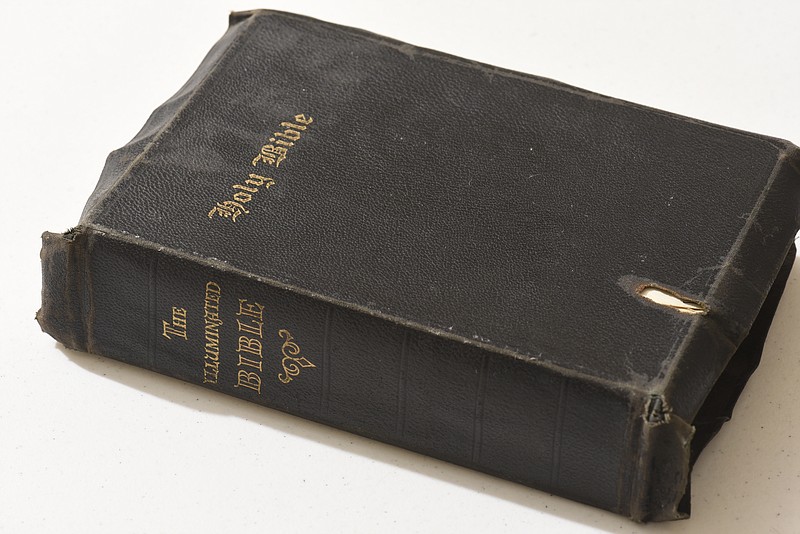NASHVILLE - Republican Gov. Bill Haslam on Thursday vetoed a controversial bill that sought to make the Holy Bible the official book of Tennessee government, triggering a planned veto override by GOP sponsors.
If Rep. Jerry Sexton, R-Bean Station, and Sen. Steve Southerland, R-Morristown, are successful, it would be the first time in Tennessee history - or at least since post-Civil War Reconstruction - that a Republican-controlled General Assembly will have overridden a Republican governor.
Haslam offered two reasons for his action in his veto message, the fourth time he's vetoed a bill during his nearly 5 1/2 years in office.
One reason was secular. The other reflects the religious views of Haslam, who once weighed attending a seminary after college.
The governor first cited Tennessee Attorney General Herbert Slatery's legal opinion last year that the bill violates the Establishment Clause of the U.S. Constitution as well as Article I, Section 3 of the Tennessee Constitution. The state constitution says "no preference shall ever be given, by law, to any religious establishment or mode of worship."
Then Haslam offered his own take about adding the Bible to the lengthy list of state symbols that include the cave salamander, the honeybee, a murder ballad and, just this year, a .50-caliber sniper rifle.
"My personal feeling is that this bill trivializes the Bible, which I believe is a sacred text," the governor wrote. "If we believe that the Bible is the inspired word of God, then we shouldn't be recognizing it only as a book of historical and economic significance."
In the preamble to the designation in their bill, Sexton and Southerland cite the historical and cultural significance of the Bible in Tennessee.
Haslam said if lawmakers are "recognizing the Bible as a sacred text, then we are violating the Constitution of the United States and the Constitution of the State of Tennessee by designating it as the official state book."
Southerland, an ordained minister, filed notice with Senate Clerk Russell Humphrey on Thursday afternoon, writing, "I intend to move to repass Senate Bill 615, notwithstanding the objections of the executive."
He said that would be either on Monday or Tuesday depending on when the House sends the bill back to the Senate.
State lawmakers return to the state Capitol in Nashville on Monday to conclude their annual legislative session and hope to adjourn Tuesday.
Sexton, also an ordained minister, said in a statement that "according to polling, 62 percent of all Tennesseans favor making the Holy Bible the state book in order to recognize its significance from a historical, economic and cultural standpoint.
"Senator Southerland and I are prepared to move forward with a veto override, and we plan to do exactly that," he added.
The bill narrowly passed the 99-member House last year with 55 votes, five more than the required 50. It made it through the 33-member Senate with 19 votes. Seventeen votes are required for passage.
But overriding a governor's veto is not very hard in the General Assembly. It only takes the same number of votes as it does to pass a bill: 50 votes in the House and 17 in the Senate.
Still, since senators passed the bill last month, the filing deadline for candidates running for the General Assembly has passed. That combined with potential concerns about overriding their own governor could prompt some Republicans to hit the pause button.
It's a unique situation for legislative Republicans who gained firm control of the General Assembly in 2010 contests.
Before that, no Republican-dominated legislature had existed since Reconstruction days, let alone one dealing with a Republican governor.
Haslam's veto drew praise from Hedy Weinberg, the American Civil Liberties-Tennessee executive director, who said in a statement that it sends "a clear message that Tennessee values and respects the religious freedom of all Tennesseans. Religion thrives when it is left in the hands of families and faith communities."
Weinberg said publicly elected government officials "cannot use their official positions to favor one religious belief over another. The governor's veto of this unconstitutional legislation ensures that religious freedom can flourish in Tennessee."
David Fowler, a former state senator who heads the Family Action Council of Tennessee, said in his own statement that "throughout the debate on House Bill 615 we have said we understand why some believe, as the Governor does, that the designation of the Holy Bible as the state book 'trivializes' its sacred character."
But Fowler noted, "we have also said that of all the books published or used throughout the history of the State of Tennessee, the Holy Bible has played a unique role both historically and economically. The legislature has spoken and so has the Governor.
"Now the ball is back in the legislature's court, and, as before, we defer to their judgment in this matter."
Contact Andy Sher at asher@timesfreepress.com, 615-255-0550 or follow twitter at AndySher1.
